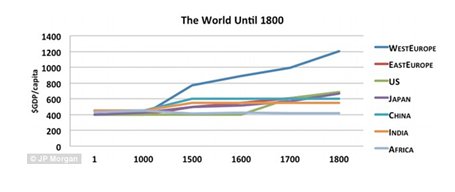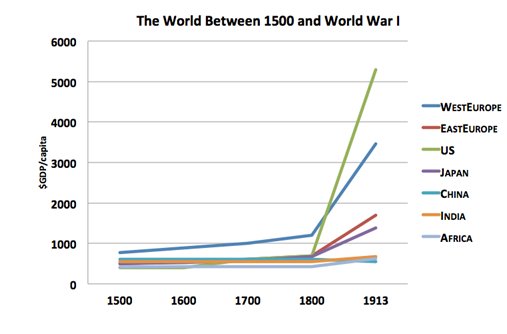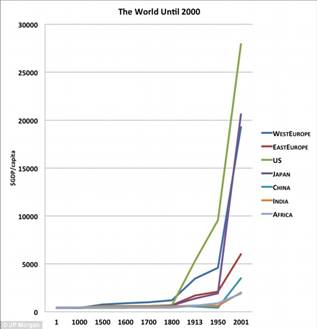Romney Right on Culture
[I]t is America’s culture that enabled the nation to become and remain the most powerful and beneficent country in the history of humankind.
by Donald Devine
Media intellectuals jumped at Mitt Romney when he recently  told an Israeli audience:
told an Israeli audience:
As you come here and you see the [gross domestic product] per capita, for instance, in Israel, which is about $21,000, and compare that with the GDP per capita just across the areas managed by the Palestinian Authority, which is more like $10,000 per capita, you notice such a dramatically stark difference in economic vitality. Culture makes all the difference. Culture makes all the difference.
Was the reference to culture a racist statement against Arabs and Palestinians as the U.S. media portrayed it? That is a reckless charge when one recalls that a 2002 United Nations-supported Human Development Report written by Arab intellectuals concluded “culture and values are the soul of development.” In a 2010 book No Apology, Mr. Romney had actually quoted an authority in the field to make the same point but in a larger context than Israel or Palestine:
Harvard professor David Landes’s Wealth and Poverty of Nations adds crucial insight as to why some nations prosper and others do not. His examination concludes that “culture makes all the difference,” not only when it comes to understanding why great civilizations failed in the past, as described earlier, but also in explaining why differences between nations exist today. What people believe, value, strive for, and sacrifice for profoundly shape the nature of their society and affect its prosperity and security. So while America’s abundant natural resources certainly facilitated its ascent, it is America’s culture that enabled the nation to become and remain the most powerful and beneficent country in the history of humankind.
When confronted on the matter Romney simply responded “I tend to tell people what I think.” As a matter of fact, he was accurate as a look at The Wall Street Journal/Heritage Foundation empirical analysis titled Index of Economic Freedom makes clear. Yes, these are right-leaning organizations but the data are all from governmental and authoritative sources. Indeed, a first glance at the Index looks like Romney might be wrong. The two most highly rated economically free and prosperous nations are not Western nations but are Hong Kong and Singapore. Indeed, 9 non-European countries – including Mauritius, Bahrain, Taiwan, Macau, Japan, Saint Lucia and Qatar – appear among the 28 countries in the top two “free nation” categories.
On the other hand, two-thirds or 19 of the top-rated nations are European or, like the U.S., are former colonies with predominant European culture and populations. Even among the 9 non-European nations, most were European colonies or protectorates for substantial periods of time, Hong Kong for a century. Mauritius was unpopulated until occupied by the Portuguese and Dutch. Even Japan is not an exception since it did not achieve economic freedom or widespread prosperity until after undergoing U.S. occupation. Only Taiwan had no direct European control before achieving economic freedom and prosperity although even there its free market reformers were all Western influenced. The rest of the top 50 rated free economies were also heavily influenced by European origin, occupation or colonization, including Israel at number 48.
Atlantic magazine, certainly not a right-wing source, has just reported a fascinating series of charts describing the economic history of the world since 1 AD, based upon a research letter written by Michael Cembalest, chairman of market and investment strategy at JP Morgan. Though the methodology has been questioned and the estimates are based on limited data no one else has presented anything better. It has been dismissed off-hand by some mainly because they have so much emotionally invested in alternative theories.
Conventional beliefs are that the West’s economic take-off coincided with the Renaissance (14th to 16th Centuries), the Reformation (16th Century), the Enlightenment (17th Century), or the beginnings of the Industrial Revolution (18th Century). But which? The first chart from the Atlantic study suggests that the sharpest up-turn in economic growth took place much earlier, indeed back in the 11th Century. Actually these data confirm more recent historical studies by medieval scholars such as Jean Gimpel among others who traced the rise in wealth and population at that time to the invention of scientific agriculture and water power manufacturing at Cistercian monasteries whose accomplishments are recorded in the Doomsday record book of 1086 and other early sources. The Dark Ages might not have been so dark.
Why do most people have the idea of such a “dark age”? The answer is that all of the major sources of our modern knowledge come from those who had an interest in making those ages look bleak. Voltaire’s French secular revolutionaries could not invent an “enlightenment” if all before it had not been dark. The fact that Newton took his main ideas from the 14th Century monk and scientist Bradwardine or that Galileo took the law of falling bodies from physicist and bishop Oresme did not fit the script. Similarly Reformation reformers could not have reformed if what went before had not rotted. Even post-Trent Catholics wanted to forget earlier excesses once embarked on their Counter-Reformation. No one had an interest in an inventive and prosperous medieval period. Yet, in fact as the table and modern research make clear, it was. The chart shows there was a second economic up-turn at the Enlightenment but its slope was not as high as the initial economic takeoff that set Europe above the rest of the world ever after.

As the next chart demonstrates, things pretty much stayed the same until the 19th Century second industrial revolution pushed Western Europe up even more dramatically. But out of nowhere came this upstart United States that shot past its mother country and all of its continental rivals combined taking their culture of freedom to new heights of refinement and success. By World War I, Eastern Europe, from the same cultural source, began its take-off, followed by Westernizing Japan, although both remained well behind the Western leaders.

The final chart brings things up to date. The big gainer by the end of the 20th Century was Japan which almost matched Western Europe but leveled off near its close, with the United States still very much in the lead. The chart likewise records the rapid rise of India, China and even Africa but with all still below the point the U.S. had achieved back in 1900. In sum, European cultures still dominate economically, with the only exceptions heavily influenced by that same culture.

The major argument against the culture thesis has been made by Fareed Zakaria who contends that “historically the key driver for economic growth has been the adoption of capitalism and its related institutions and policies across diverse cultures,” citing India and China as examples. But this is misleading. India is 128th on the worldwide economic freedom list, considered “mostly unfree,” and China is in the same category listed at number 138. And, as the charts demonstrate, they lag economically. Yes, these have seen major growth as they have adopted some market reforms but they are still mainly poor and not very free. More important, Mr. Zakaria’s quote has a major hidden qualification – it was not only accepting capitalism that was essential but also adopting the West’s “related institutions” – whose growth is even more dependent upon culture.
Take the twelfth highest rated economically free nation, Bahrain. Unquestionably, its economy has many free market elements that allow it to prosper. But it is a centralized Sunni monarchy that was forced to call in Saudi troops in 2011 to quell a restive Shia majority popular uprising. Large protests have occurred ever since. Even Hong Kong is straining under increasing mainland Chinese control, including recently dictating textbook content. Singapore has only a quasi-free political system, threatened by Chinese, Malay and Muslim conflict. How long will these remain so high on the list? Of course, there is no guarantee for the European cultures either, even for the United States. One of the first European states to rise economically, Italy, has fallen to 92nd freedom rank and 0.4 percent growth. As a result of restrictions on contract rights in the Chrysler, GM and financial nationalizations, the Index has removed the U.S. from its highest freedom rating for the past three years.
Still, today, whatever gloss one wants to put on it, in all of the stable economically free and prosperous nations the fact of a European cultural background makes all the difference. On the question of cultural influence, the intellectuals were wrong and the politician was right.
Donald Devine, the editor of ConservativeBattleline On Line, was the director of the U.S. Office of Personnel Management from 1981-1985 under Ronald Reagan and is Senior Scholar at The Fund for American Studies.
Help Make A Difference By Sharing These Articles On Facebook, Twitter And Elsewhere:
